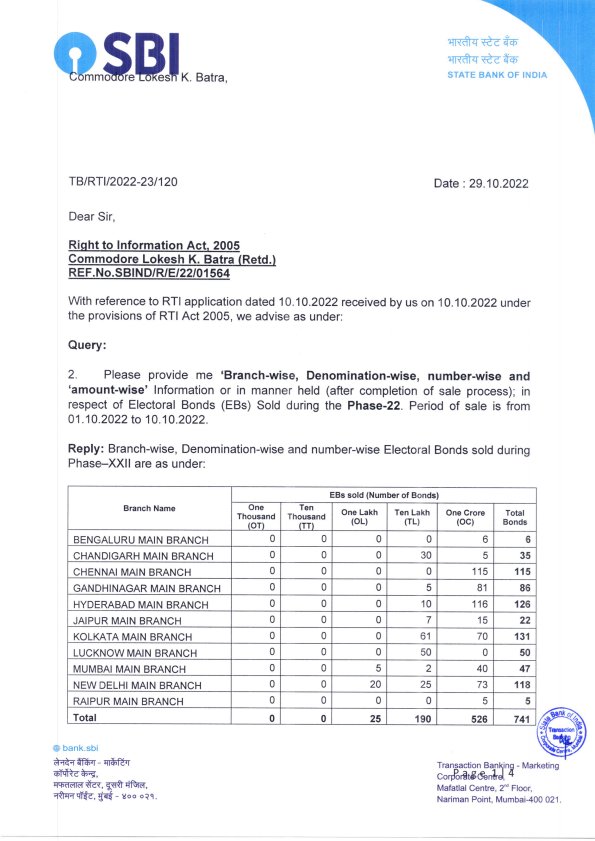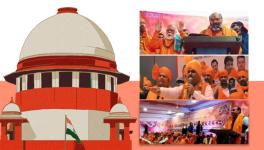90% of Electoral Bonds Worth Rs 545 cr Received by BJP, Congress, NCP, TMC
A whopping Rs 545 crore was received by political parties through the 22nd sale of anonymous Electoral Bonds (EBs) between October 1 and 10 ahead of the Himachal Pradesh and Gujarat Assembly elections, a Right to Information (RTI) query has revealed. During the previous sale of EBs in July, political parties received Rs 389.50 crore, The Indian Express reported.
In reply to the RTI application, filed by retired Commodore Lokesh K Batra, the State Bank of India (SBI)—the only bank authorised to sell the bonds—said on October 29 that the total amount collected by parties from anonymous donors in 22 phases since 2018 has increased significantly to Rs 10,791 crore. Out of this amount, bonds worth Rs 10,767.88 crore were encashed with the remaining Rs 23.59 crore transferred to the Prime Minister’s National Relief Fund.
In 2019-20, the BJP received more than 75% of the bonds, according to the Election Commission data.

A total of 738 EBs worth Rs 542.25 crore were redeemed by parties in the latest phase, according to the SBI reply. EBs worth Rs 117 crore were purchased from the SBI’s Hyderabad main branch and Rs 115 crore from the Chennai branch. The query revealed that as much as 96% of the EBs sold were of the face value of Rs 1 crore each.
Delhi (Rs 285.15 crore) topped the list when it came to encashing the bonds, followed by Kolkata (Rs 143.10 crore) and Hyderabad (Rs 67 crore). Bonds were also encahsed from SBI branches in Gangtok (Rs 2 crore), Chennai (Rs 10 crore) and Bhubaneswar (Rs 35 crore), the reply revealed.
The SBI reply also showed that 25 political parties have opened special current accounts to redeem and encash electoral bonds as of March. Without naming the parties, as the accounts are held in a fiduciary capacity, the SBI said that “25 political parties have opened their account for the purpose of encashing Electoral Bonds till date”.
The Finance Bill, 2017, introduced EBs as interest-free bearer instruments available for purchase within 10 days in every quarter. Major political parties have not disclosed the amount they received through EBs so far.
EBs, which have become highly controversial due to their alleged opacity, allows individuals and domestic companies to present these bonds—issued in multiples of Rs 1,000, Rs 10,000, Rs 1 lakh, Rs 10 lakh, and Rs 1 crore—to political parties, which have to redeem them within 15 days.
On October 14, the Supreme Court said that it would examine whether a clutch of pleas submitted by NGO Association for Democratic Reforms (ADR), the Communist Party of India (Marxist) and others challenging laws permitting the funding of political parties through EBs should be referred to a larger Bench on December 6, PTI had reported.
The Centre printed 10,000 electoral bonds worth Rs 1 crore each between August 1 and October 29, according to two RTI replies from the SBI on those dates, The Indian Express reported. According to the October 29 reply by SBI to RTI activist Kanhaiya Kumar, the last time the government printed electoral bonds, in 2019, bonds worth Rs 11,400 crore in different denominations were printed at the India Security Press in Nashik.
CPI(M) general secretary Sitaram Yechury said that while the apex court is yet to decide on EBs, the “delay seem to sanction it as fair accompli”. “More than 800 crore people need dry rations to survive. But so much money secretly being gathered for elections?” he tweeted.
Rajasthan chief minister Ashok Gehlot alleged on Saturday that “95% of the total donations are going to BJP” after the introduction of EBs.
“Following the introduction of electoral bonds, 95% of the total donations are going to BJP. Donors are not giving to other parties out of fear. BJP has introduced a model wherein money collected through donations is being used to change state governments—like they did in Maharashtra and Karnataka,” he alleged during a press conference held in Surat as part of the Congress’s campaign for the Gujarat election.
The ADR has called for doing away with the principle of anonymity of the bond donor. “All political parties which receive donations through Electoral Bonds should declare in their Contributions Reports the total amount of such donations received in the given financial year along with the detailed particulars of the donors as against each bond; the amount of each such bond and the full particulars of the credit received against each bond,” the NGO said in a report.
Get the latest reports & analysis with people's perspective on Protests, movements & deep analytical videos, discussions of the current affairs in your Telegram app. Subscribe to NewsClick's Telegram channel & get Real-Time updates on stories, as they get published on our website.
























